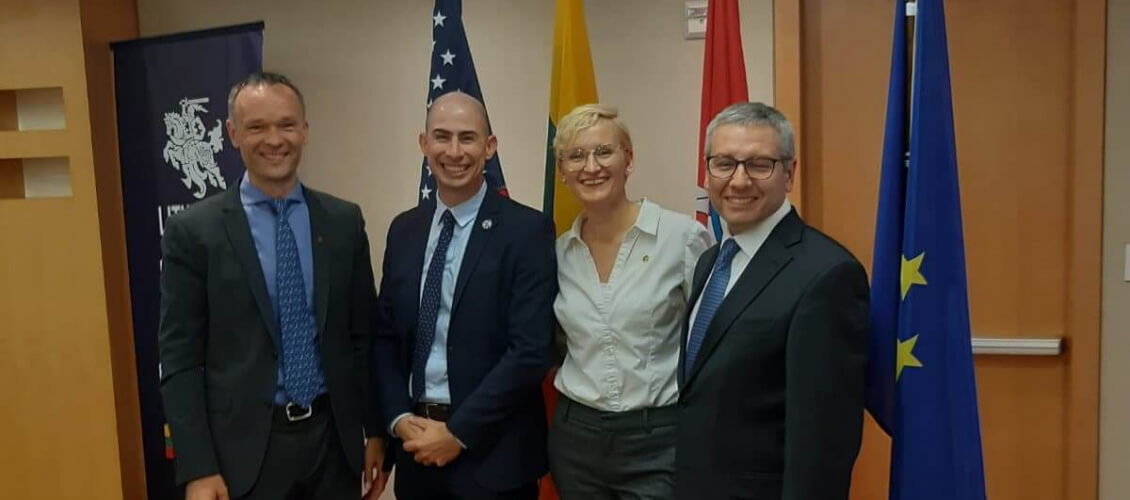Given the research-intensive agenda of Assoc. Prof. Sagatienė’s residence at Columbia University, she has primarily been collecting and investigating material using different libraries and important archival sources at Arthur W. Diamond Law Library at the Columbia Law School, Lehman Social Sciences Library at the School of International and Public Affairs and New York Public Library, and Butler Library at the Columbia University, where EHU faculty member was able to explore the first English translation of a secret 1941 USSR order to deport Lithuanians, Latvians, and Estonians. Additionally, collections of the Library of Congress, R. Lemkin Archive at Columbia University, United Nations Archives and Records Centre were used in order to collect valuable material about the preparation and implementation of the 1948 Convention on the Prevention and Punishment of the Crime of Genocide.
During her Fulbright tenure, Assoc. Prof. Sagatienė was involved in a range of professional meetings and participated in relevant seminars, conferences, and workshops at other US academic institutions, featuring, but not limited to:
- Meetings with Georgian President Salome Zourabichvili and Estonian Foreign Minister Urmas Reinsalu, where the legal outlook on Soviet crimes in these countries was discussed
2019 Raphael Lemkin Book Award Ceremony hosted by the Cardozo Law Institute in Holocaust and Human Rights, where Prof. Robinson shared insight about the negative aspects of performing such research and a closed seminar with former UN High Commissioner for Human Rights Prince Zeid Ra’ad Al Hussein - Discussion on the Baltic Victims of the Soviet and Nazi Regimes & Film Screening of Ashes in the Snow, hosted by the Embassy of the Republic of Lithuania in Washington D.C. and US Capitol
- Professional meetings with the experts in the field, including Prof. Robert Jervis, Prof. Katharina Pistor, Prof. Stephen Sestanovich, and many others
In order to raise international awareness on the topic of her research, on November 15, 2019, Assoc. Prof. Sagatienė initiated a workshop at the Embassy of Lithuania in Washington DC, named “The Nuremberg that never happened. The case of Soviet crimes in postwar Lithuania”. The event was opened by Ambassador Rolandas Kriščiūnas and Lithuanian Defence Minister Raimundas Karoblis. It was also supported by the remarks of Mr. Jason Steinhauer, the Director of the Lepage Center for History in the Public Interest, Villanova University, Pennsylvania, who presented his ideas about the spread of fake history in current social media platforms. The event was moderated by Dr. Peter Roudik, Director of the Global Legal Research Center, Library of Congress, Washington DC.
In December 2019, Assoc. Prof. Sagatienė presented a paper “European Court of Human Rights – The Soviet Nuremberg or Memory Traps” at the 8th Annual Conference “Prevention Activism: Advancing Historical Dialogue and in Post-Conflict Settings” organized by Historical Dialogues, Justice, and Memory Network and hosted by Columbia University. This conference explored activities that can be defined as “prevention activism“, i.e. efforts to record, acknowledge, address and redress the violent past, and their academic analysis.
Thanks to Fulbright residency, Assoc. Prof. Sagatienė was able to draft a 29 000-word research article for a further publication in one of the leading journals in the area of genocide studies. The original contribution in this article is the examination of recent judgments by the ECHR regarding the application of the term “genocide” to the context of Soviet Lithuania, in particular, regarding the killings of guerilla fighters. The analysis includes different sides, and the rulings are explained in the framework of international criminal law. Assoc. Prof. Sagatienė plans to publish her research findings in regard to the application of the Genocide Convention to the Soviet deportations as a separate article.
Assoc. Prof. Sagatienė joined EHU faculty in October 2019 and has become one of the only two Fulbright Visiting Scholars from Lithuania in AY 2019/20. In addition to her teaching and research activities within the International Law and European Union Law program at EHU, Assoc. Prof. Sagatienė is a Legal Research Group consultant at the Supreme Court of Lithuania.
